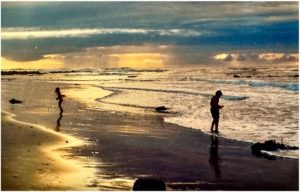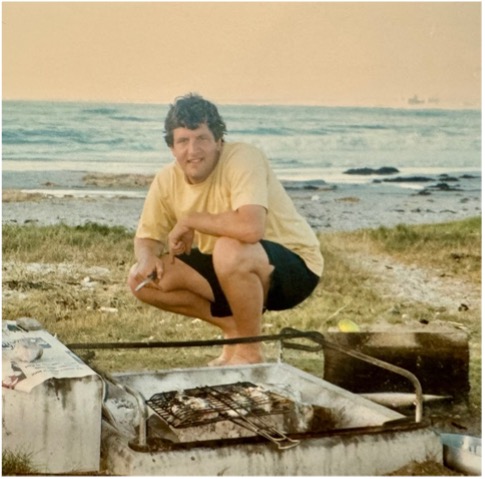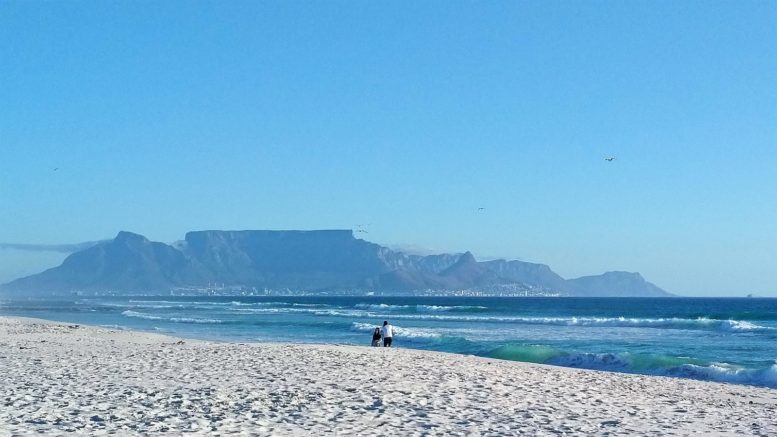Dr. Johan Tredoux

One of my fondest memories of my childhood was opening Christmas presents on the beach on Christmas day. December was summer in South Africa and over the holidays many families headed for the coastal cities to be close to the sea. It wasn’t any different for us, as every December, we made the great annual trek driving down from Johannesburg to Cape Town to vacation at Melkbosstrand (Milk-Bush-Beach) just 15 miles north of Cape Town).
I recall, on Christmas day, sitting under the Beach Umbrella in our swimsuits, with our feet and hands sunken in the warm white-colored beach sand, listening, as my dad shared the Christmas story from Luke Ch 2. This was usually followed by us singing “Silent Night” in Afrikaans and then opening our presents. Our gifts were usually bought with the beach in mind. One year I got a boogie board, and another year a kite. After swimming in the frigid cold water, we would then gather for our Christmas meal, which always included fresh fish my mom and dad grilled on the beach. My dad’s favorite fish was an indigenous fish called Galjoen. It had a very rich, creamy, and special marine-like taste.
What I didn’t know, at the time, was that we were swimming on a “Whites Only” beach. Six miles south of our vacation spot in Melkbosstrand, across the frigid cold Atlantic, you could see the silhouette of Robben Island appearing to rise and fall in rhythm with the waves crashing on the beach. What I didn’t know was that Nelson Mandela was in prison on Robben Island at that time. It was Christmas in South Africa during the ugly days of apartheid.
I have often wondered what difference it made that we were celebrating the birth of Christ, and singing about heavenly peace, all while many people were suffering under the oppressive rule of the White Nationalists party. Because of my privileged status as a white Afrikaner, I was completely ignorant of the plight of my fellow South Africans who were suffering under the racist policies of the then-Apartheid government.
I ask these questions as I read that Christmas was canceled in Bethlehem amidst the terrible war in Gaza. I can hardly blame them. But it begs the question? Shall we cancel Christmas in solidarity with those who are suffering across the world? The answer to my own question comes from a surprising place.

Yesterday, as I was going through some picture albums, I came across pictures taken about 25 years later on the very same beach close to Cape Town. This time it was with my wife and two children. Nathaniel and Lauren were 10 and 5 years old. There was also a picture of me grilling fish on the beach. Besides the fact that I was passing on traditions from my growing up years, something struck me… As I looked at the silhouette of my kids playing on the beach as the sun set, I realized, that Melkbosstrand was no longer a “whites only” beach and Nelson Mandela was no longer in prison on Robben Island. Significant changes for the good took place during that time. Those of African descent could vote for the first time in South Africa.

One of the ways to answer my question lay hidden in our family picture album. The story of Christmas is a story of hope and peace. Christ coming holds out the hope that peace remains a possibility. That people’s hearts can change. I for one, don’t believe that we can turn ourselves around by ourselves. Celebrating Christmas seems almost audacious in a world of suffering and pain. And yet, I don’t believe the Christmas story asks us to put away our sorrow, bury our grief, or ignore the evil and despair outside our windows. The Christmas story tells about a Christ who came to carry our burdens with us. Like Jonathan, my brother-in-law, says: “Love is like a burning fire… in the midst of hell.”
Christmas beckons us to hope, not in our political solutions, even though I would always vote for those who most closely resemble the love of Christ, but for the one who has come to initiate a new kingdom. A Kingdom where the prodigal son can come home, the adulteress woman can be forgiven, and nations can live in peace with their neighbors. We can celebrate Christmas, then, because God looked evil in the face and sent Jesus to show us how to be human. The baby is Immanuel, “God with us.”

